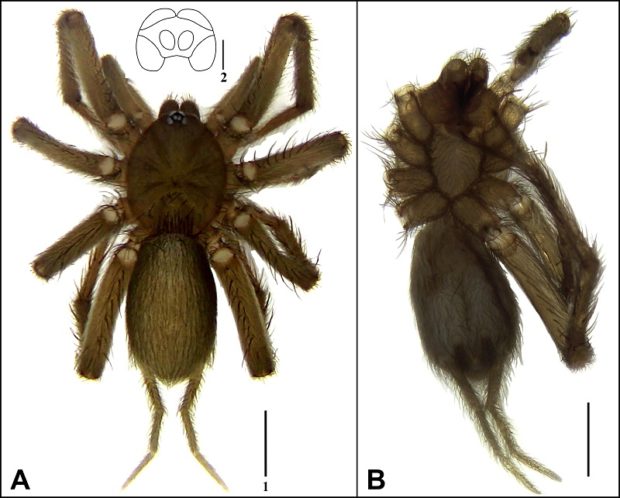
NEW SPECIES “Masteria urdujae” sp. nov. was found under rock debris at the entrance to a newly explored cave in Pangasinan province. It is the smallest of its genus, “masteriine,” recorded in the Indomalayan region. An adultmale is about 4 millimeters. —CONTRIBUTED PHOTO
SAN PEDRO CITY — Tiny but fierce with six eyes, a new spider species has been named after Princess Urduja, a legendary warrior said to have ruled the precolonial kingdom of Tawalisi, now known as Pangasinan.
Masteria urdujae sp. nov. is currently the smallest of its genus, masteriine, recorded in the Indomalayan region. An adult male measures just about 4 millimeters.
Up to 8 eyes, or none at all
It is also, so far, the third masteriine spider species from the Philippines taxonomically described or included in the scientific database since 1892, after Masteria caeca and Masteria cavicola, which were discovered in Morong and San Mateo towns, respectively, in Rizal province.
Spiders belonging to this genus typically have eight or six eyes or none at all, said University of the Philippines Los Baños (UPLB) graduate student Joseph Rasalan.
They also usually have long spinnerets.
“It’s a like a tarantula, but different,” Rasalan said in a phone interview.
At present, there are 31 known species of the masteria spiders distributed across Fiji Islands, Micronesia and Indomalaya.
Apt name
Rasalan, 25, described the new spider species in a paper she coauthored with UPLB faculty member Aimee Lynn B. Dupo, who has a Ph.D. in entomology and a known spider expert.
The paper was accepted by the Journal of Asia-Pacific Biodiversity on Jan. 9 for publication.
The spider, described as “entirely brown” with a pear-shaped bulb and a carapace “clothed” with brown hair, was collected during a science expedition in 2017.
The new spider species was found under rock debris at the entrance of Pelpel Cave, a newly explored limestone cave at Barangay Centro Toma, Bani town, Pangasinan province.
“We think it is just apt that we name [the spider] after a local figure from Pangasinan. It is part of our goal to raise awareness, hopefully, for [the community’s] conservation of the species,” Rasalan said.
Although her existence in real life remains debatable, several literature and accounts of Princess Urduja described her as a fearless, intelligent and kind heroine, who vowed to marry only the man who would defeat her in battle.
Urduja never married, according to folklore.
The discovery of the new species shows that a lot of things have yet to be learned about caves in the country, according to Dupo.
“Since these spiders are found underneath the rocks in caves, cave explorers are likely to disturb this species,” she said.
First step
Dupo said spelunking and cave explorations must be done with care or “we might lose [these species] way before we get to know them in full detail.”
The holotype, or single physical example, of urdujae is preserved at the UPLB Museum of Natural History.
Rasalan said identifying a species was “just the first step” in a long process of studying biodiversity.
He said his group was hoping to collect a female specimen next and observe the spider’s activities and roles in keeping ecological balance.